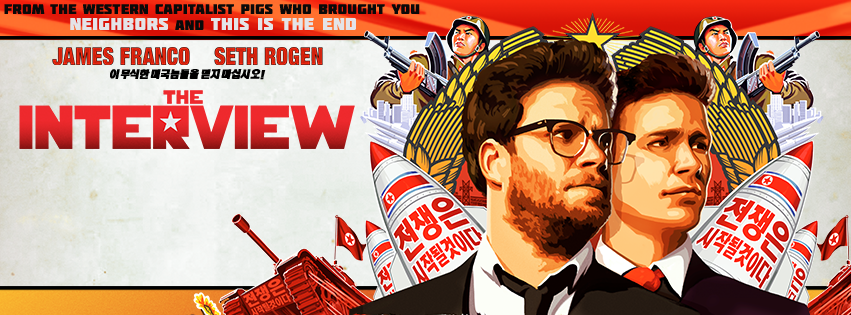 If you haven’t heard about The Interview by now, don’t feel embarrassed any longer. Between the cyber-hack of a major corporation, alleged threats from North Korea, theatre cancellations and a speech by Obama, a lot can be confusing. The story follows two journalists set to interview Kim Jung-un, later instructed by the CIA to assassinate him. While the release date was originally set for October 2014, viewers wondered if a comedy this political would create controversy.
If you haven’t heard about The Interview by now, don’t feel embarrassed any longer. Between the cyber-hack of a major corporation, alleged threats from North Korea, theatre cancellations and a speech by Obama, a lot can be confusing. The story follows two journalists set to interview Kim Jung-un, later instructed by the CIA to assassinate him. While the release date was originally set for October 2014, viewers wondered if a comedy this political would create controversy.
And these people turned out to be right. Throughout the summer, several spokespeople of North Korea spoke out against the release of the film. The Korean Central News Agency, government-run, declared “stern” and “merciless” vengeance against the movie, calling it a “blatant act of terrorism [that] will absolutely not be tolerated.” The Agency even wrote to President Obama, asking to have it pulled from theatres. Even North Korea’s UN ambassador paralleled the movie to terrorism, calling it “an act of war.”
The movie’s original fall release was changed to December 25th, supposedly to reduce politically insensitive scenes. Costumes and props were made less cartoon-esque and more true to reality, and scenes involving Kim Jung-un were shortened. This is when the infamous Sony Pictures Entertainment hack occurred. The first known attack happened on November 24th, when Sony employees opened their computers to find a picture of a red skull, paired with a warning of releasing “top secrets.” The anonymous group “Guardians of Peace” leaked personal emails, employee records, and unreleased Sony films to the general public. To counteract the spread of information, Sony turned off all email and messaging for a week, leaving employers to communicate via phone calls and handwritten notes.
The general public was not threatened until December 16th, when hackers released an open letter in broken English, stating that they would attack the New York premiere, as well as other theatres showing the film. Being aware of these questionable threats, powerful theatres nationwide retracted The Interview, including AMC and Regal, two chains guaranteeing great box office income. Sony stated that they “respect and understand” this decision, and after initially cancelling all releases involving The Interview, proceeded with limited showing of the movie on Christmas Day. Additionally, the public could purchase streaming of the movie on platforms such as YouTube and Google Play, as well as SeeTheInterview.com. Currently, the movie can be viewed by the masses on Netflix. Sony will continue with international wide release, as well as DVD on February 17th.
North Korea denied involvement from the start, but today the US government possesses evidence proving this false. The malware used to break into Sony’s network came from a computer running in the Korean language, for starters. More indirectly, North Korea contains a secret division called Unit 121, whose members are specifically asked to infiltrate networks and plant viruses. They are known as the “third-largest cyber intelligence unit in the world, behind the US and Russia,” according to Time. However, nothing has been confirmed either way, since hackers could have pretended to be Korean to divert suspicion.
Whoever the hackers are, while their original goal was unsuccessful, Sony did lose extreme sums of money while scrambling to release The Interview. Currently the movie has grossed over $40 million in online streaming, and a bleak $5.4 million in independent box offices. While Sony is anticipated to break even with online sales, experts estimate that at the end of the day they lost about $30 million from box offices everywhere.
Now that the dust has settled, and we are able to watch the movie in bed, with pajamas on and excessive free snacks by our side, we can decide whether the movie was even good, or worth the immense controversy around it.
So what do you think? Was the movie offensive, or just a comedy?
“I get why North Korea could have been offended,” says entrepreneurship major Anthony Scotto ‘18. “If they made the same movie about our president, we wouldn’t take it lightly.”
So then did “Guardians of Peace,” whatever nationality they may be, have any right to hack Sony?
“Absolutely not,” says political science student Liz Platanova ‘18. “Regardless of how offended anyone may be, hacking is always wrong.”
Obama spoke up against Sony, saying they should not feel intimidated by threats imposing censorship on the US. And the masses agree. To Platanova, “Waiting to release the movie was smart, considering the threats, but not releasing it at all would be censorship.”
But at the end of the day, the real question remains: Was the movie any good?
“It’s just a goofy comedy,” says freshman business major Austin Stadler ’18. “It definitely wasn’t meant to be taken as seriously as it was.”
Whether or not The Interview was worth the hype is up to you, but at least now you can explain it to your mom when she calls.